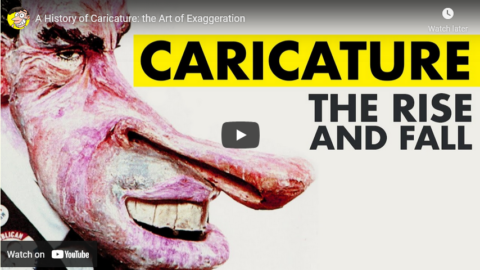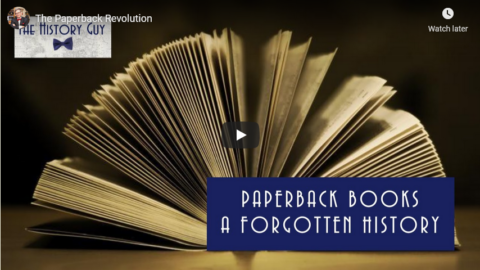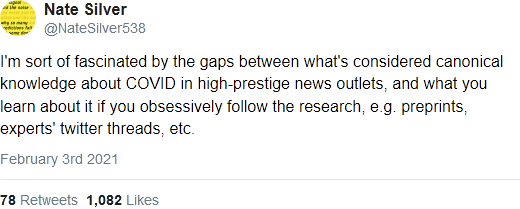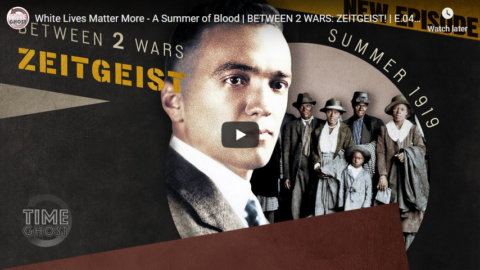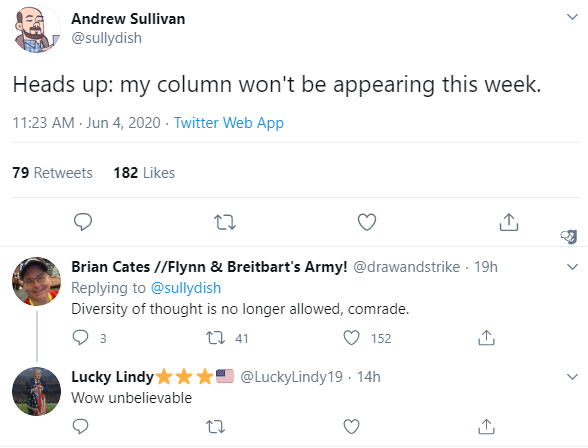RULE # 1: Because journalists are required to be open-minded, exercise independence of spirit, and display a healthy amount of skepticism, the words and deeds of politicians, leaders, and the powerful — as well as those of regular citizens being interviewed — must constantly be questioned, second-guessed, doubted, fact-checked, challenged, and, more often than not, interrupted (more or less politely).
RULE # 2: Rule # 1 only applies to Republicans.
(And to anybody leaning conservative.)
For Democrats and leftists, the typical query is more along the lines of “pray enlighten us to your glorious plans for fundamentally transforming the United States of America (we will be quiet now).” (Close second: “kindly tell us how much people have suffered, and are still suffering, in this dreadful country of ours.”)
Erik, “The Two Rules of Modern Journalism”, ¡No Pasarán!, 2021-04-16.
July 25, 2021
QotD: The Two Rules of Modern Journalism
July 10, 2021
A History of Caricature: the Art of Exaggeration
J.J. McCullough
Published 27 Mar 2021Let’s look at the history of caricature, the art of drawing exaggerated cartoon pictures of famous people like celebrities, politicians, and movie stars. We’ll look at the style of great artists like Al Hirschfeld, Gerald Scarfe, and Robert Risko among others.
Voice cameo by Alec: https://www.youtube.com/user/bostwiki
FOLLOW ME:
🇨🇦Support me on Patreon! https://www.patreon.com/jjmccullough
🤖Join my Discord! https://discord.gg/3X64ww7
🇺🇸Follow me on Instagram! https://www.instagram.com/jjmccullough/
🇨🇦Read my latest Washington Post columns: https://www.washingtonpost.com/people…
🇨🇦Visit my Canada Website http://thecanadaguide.comHASHTAGS: #caricature #art #history
July 7, 2021
QotD: Bad language from Down Under
Barry McKenzie, Australian at Large, made his debut in the 10 July 1964 issue of Private Eye. He was the creation of the comedian Barry Humphries, then, like a number of other creative Aussie expats, resident in London. Hero of a new strip cartoon, illustrations by Nicholas Garland, Bazza, as he would become known, was identified in this first outing as “a strapping young specimen of Australian manhood” and self-described as “an ordinary honest working-class bloke”. His first words “Excuse I, what’s gone flaming wrong?” informed readers that they were in the presence of an antipodean Candide, the classic hick, come to the big city and ready to surf on a tide of Foster’s lager into what within a year would be apostrophised as “Swinging London”.
Naive he surely was — and while over his nine-year career at the Eye he might increasingly turn the tables on the Brits, that innocence never wholly disappeared — in one respect he was omnipotent. His slang-laden, all-Australian language burst into the Eye reader’s consciousness fully-formed and quite astounding. By 1968 Bazza was offering freckle puncher, smell like an Abo’s armpit, bang like a shithouse door, dry as a nun’s nasty, point Percy at the porcelain, siphon the python and perhaps the most celebrated, the Technicolour yawn (aka the liquid laugh or the big spit).
[…]
It was also resolutely carnal: in its concentration on defecation and urination, drinking (and the seemingly inevitable vomiting it induced) and copulation (even if Bazza remains the eternal virgin), Humphries either created or collated a vocabulary that would not be rivalled until Viz magazine’s “swearing dictionary” Roger’s Profanisaurus began appearing in 1997.
Rooted, from Amanda Laugesen, director of the Australian National Dictionary Centre at the Australian National University and chief editor of the Australian National Dictionary, focuses on this side of the Australian vocabulary. Rooted comes from root, a euphemism for fuck, both literally, in the context of sex, and figuratively, as in harm, destroy, and so on. It falls into what Laugesen is happy to term “bad language”, even if one might suspect that with her formidable knowledge it is a term she knows perfectly well is a construct of tabloid moralising and empty religiosity. (Perhaps I am hardened by proximity, but I find it sad she feels the need to warn readers they will encounter the language that is the subject of her work.)
Jonathon Green, “Fair dinkum dictionary”, The Critic, 2021-04-08.
June 17, 2021
March 13, 2021
The Paperback Revolution
The History Guy: History Deserves to Be Remembered
Published 12 Mar 2021Sponsored by Blinkist. The first 100 people who go to https://www.blinkist.com/thehistoryguy are going to get unlimited access for one week to try it out. You’ll also get 25% off if you want the full membership.
Today, the most popular book format in the world is not a traditional hardcover book, nor an ebook, but a paperback — a format that changed the what, how, when and how much the world reads. It is history that deserves to be remembered.
This is original content based on research by The History Guy. Images in the Public Domain are carefully selected and provide illustration. As very few images of the actual event are available in the Public Domain, images of similar objects and events are used for illustration.
You can purchase the bow tie worn in this episode at The Tie Bar:
https://www.thetiebar.com/?utm_campai…All events are portrayed in historical context and for educational purposes. No images or content are primarily intended to shock and disgust. Those who do not learn from history are doomed to repeat it. Non censuram.
Find The History Guy at:
Patreon: https://www.patreon.com/TheHistoryGuy
Please send suggestions for future episodes: Suggestions@TheHistoryGuy.netThe History Guy: History Deserves to Be Remembered is the place to find short snippets of forgotten history from five to fifteen minutes long. If you like history too, this is the channel for you.
Awesome The History Guy merchandise is available at:
teespring.com/stores/the-history-guyScript by THG
#history #thehistoryguy #Books
February 21, 2021
QotD: Journalism
Journalism is not a profession or a trade. It is a cheap catch-all for fuckoffs and misfits — a false doorway to the backside of life, a filthy piss-ridden little hole nailed off by the building inspector, but just deep enough for a wino to curl up from the sidewalk and masturbate like a chimp in a zoo-cage.
Hunter S. Thompson, Fear and Loathing in Las Vegas, 1972.
February 8, 2021
The quality of medical information available to journalists
Scott Alexander shows the conflicting agendas of journalists and the medical professionals they depend on for their background information in writing about medical issues:
I heard from a journalist yesterday after writing yesterday’s post on WebMD. They’ve been trying to write a coronavirus article worthy of Zvi or any of the other illegibly smart people writing on the pandemic. Apparently the bottleneck is sources.
In most journalistic settings, you can’t just write “here’s what I think”. You have to write “here’s what my source, a recognized expert, said when I interviewed them”. And the experts are pretty sparing with their interviews for contrarian stories.
The way my correspondent described it: sources don’t usually get to approve the way they’re quoted in an article, or to see it before it gets published. So they’re really cagey about saying anything that might get misinterpreted. Maybe their real opinion is that X is a hard question, there are good points on both sides, but overall they think it probably isn’t true. But if a reporter wants to write “X Is Dumb And All Epidemiologists Are Idiots For Believing It”, they can slice and dice your interview until your cautiously-skeptical-of-X statement sounds like you’re backing them up. So experts end up paranoid about saying potentially-controversial-sounding things to reporters. And since reporters can’t write without sources, it’s hard for them to write anything controversial about epidemiology.
The incentives for the journalist and their editor is to find a sensational angle to get as many people to read the piece as possible (“clickbait” works). The incentives for the “expert sources” are to avoid saying anything substantive that might provide such an angle (“don’t become a headline”). It’s no wonder that journalists with no specialized training in the experts’ area are unable to produce fully informative articles for public consumption.
February 3, 2021
QotD: The “Parkerization” of wine
… mega-star wine critic Robert Parker Jr., a man who has more influence on the taste and price of wine than anyone else has, or ever had had. Now in his seventies, Parker is retired. But back in 1975, the former lawyer, taking his lead from former presidential candidate, Ralph Nader — a consumer rights advocate — began to publish The Wine Advocate, a kind of consumer guide to fancy wine.
The world of wine had never seen anything like it. Parker was on a mission to demythologise all the snobby and obscure terminology under which fine wine was clouded and developed a simple 100 point scale on which wines could be judged.
As his influence grew, a Parker wine score in the 90s would pretty much guarantee considerable financial success to a vineyard. Inevitably, so the argument goes, those who made wine started to adjust the taste of their product so that it would suit the arbiter’s palate.
Parker generally likes big, dark, gutsy, jammy, tannic wines that can, his critics say, be engineered to taste that way in post-production, often by use of imported yeasts or through the use of young oak barrels. It’s more about clever chemistry than the particular charisma of the local terroir. Parker’s taste favours the muscular Californian Cabernet wines and the great Château wines of Bordeaux, yet has little appreciation for the lighter, less tannic, more subtle Pinot Noirs from Burgundy or Gamays from the Loire Valley. “Bad critics look at Pinot through Cabernet-tinted spectacles and so criticise it for being something it never set out to be,” writes Clive Coates, in a not so subtle dig at Parker, in his encyclopaedic The Wines of Burgundy.
Those who bewail Parker’s phenomenal influence speak of “parkerisation” as the wine equivalent of globalisation. The New York Times wine critic Alice Feiring writes that this is how “Rioja loses its Spanish accent”: parkerisation leads to an increasingly homogenised style of wine in which the diversity of grapes and wine tastes come to be submerged under the over powerful influence of Parker’s very particular palate. Those, like her, who prefer subtlety in their wine speak dismissively of Parker’s love for “jam bombs”.
Those who defend Parker, argue that his 100 point scale works as a kind of bullshit detector. It’s cutting through all the fancy talk and obscure (often) French classifications, to focus on the taste and the taste alone.
Giles Fraser, “Is wine starting to taste the same?”, UnHerd, 2020-10-14.
November 19, 2020
White Lives Matter More – A Summer of Blood | BETWEEN 2 WARS: ZEITGEIST! | E.04 – Summer 1919
TimeGhost History
Published 18 Nov 2020Technology promises a better and more connected world in the summer of 1919. But battles still rage everywhere over who will inherit it.
Join us on Patreon: https://www.patreon.com/TimeGhostHistory
Subscribe to our World War Two series: https://www.youtube.com/c/worldwartwo…
Like TimeGhost on Facebook: https://www.facebook.com/TimeGhost-16…Hosted by: Indy Neidell
Written by: Indy Neidell and Francis van Berkel
Director: Astrid Deinhard
Producers: Astrid Deinhard and Spartacus Olsson
Executive Producers: Astrid Deinhard, Indy Neidell, Spartacus Olsson, Bodo Rittenauer
Creative Producer: Maria Kyhle
Post-Production Director: Wieke Kapteijns
Research by: Indy Neidell and Francis van Berkel
Image Research by: Miki Cackowski and Michał Zbojna
Edited by: Michał Zbojna
Sound design: Marek KamińskiColorizations:
Mikołaj Uchman
Spartacus OlssonSources:
From the Noun Project: bridge by Adrien Coquet, Delete by Kevin Eichhorn, Fire by Sweet Farm, Model T by Alex Valdivia, people by Anastasia Latysheva, peoples by Musmellow, revolt by Symbolon, Smoke by Krish, people by Nithinan Tatah, explosion by Aldric RodríguezArchive by Screenocean/Reuters https://www.screenocean.com.
A TimeGhost chronological documentary produced by OnLion Entertainment GmbH.
From the comments:
TimeGhost History
21 hours ago
Four episodes into this new series and we think it’s going pretty well. Behind-the-scenes we have been getting ahead with our planning to make make things as laser-focused as possible and we have some pretty fascinating pieces of history we want to talk about.But we know that there is always a learning curve with a new series and we care what our community thinks. It’s the TimeGhost Army who make our content possible so we’d like to hear from you what you think about Season Two of Between 2 Wars. What are you enjoying about it? Is there anything you think we should work on? How do you feel about Indy’s outrageous suits and ties?
August 9, 2020
Canadian Art magazine’s “woke suicide pact”
As a cultural barbarian and all-around Neanderthal, it will come as little surprise to both my readers that I’d never even heard of Canadian Art magazine. As a result, the recent decision to cease publication due to the unresolved (and almost certainly unresolvable) issues of needing to be funded by rich white people:
These evils were explained in a long article published by Canadian Art‘s former editor-in-chief, David Balzer (self-described “gay, fag, queer. Ambivalent Libra“), in which he complains that the progressive agenda of the magazine he edited was forever being undercut by the need to solicit funds from wealthy white donors. Or, as he describes it, the pursuit of: “white, liberal money — the champagne socialists.”
Shockingly, these donors are not especially fond an incessant slew of articles with titles such as Drop the Charges and Defund the Police, Says New Artists’ Letter for Black Lives, Give Us Permanence — Ending Anti-Black Racism in Canada’s Art Institutions, and A Crisis of Whiteness in Canada’s Art Museums.
Balzer’s analysis of the growing tension between establishment donor and do-good editor is spot on:
Most boards, which are also majority white, are [interested] in going to where they believe the money is. So the argument goes: It takes a certain talent, panache, to be president, director, or CEO, to open those pocketbooks, and without these skills, culture cannot run. This argument implies that culture cannot run if its backrooms are not white … Many corporate partners make possible the lavish, yearly fundraising galas that cultural organizations host: ostentatious displays of whiteness and wealth that are the public-facing versions of the aforementioned work done by white presidents, directors and CEOs.
It’s a problem that every charity, art outlet, and activist organization in Canada will face. Supporting the arts is rarely an act of pure altruism. It has always been a status flex by the well-connected barons and baronesses of privilege. At its most cynical, arts funding is a high-class game of reputation laundering.
July 18, 2020
Andrew Sullivan and New York magazine part company “amicably”
In his final column for New York, Andrew Sullivan announces he’s going back to blogging and stop making employees there feel unsafe:
The good news is that my last column in this space is not about “cancel culture.” Well, almost. I agree with some of the critics that it’s a little nuts to say I’ve just been “canceled,” sent into oblivion and exile for some alleged sin. I haven’t. I’m just no longer going to be writing for a magazine that has every right to hire and fire anyone it wants when it comes to the content of what it wants to publish.
The quality of my work does not appear to be the problem. I have a long essay in the coming print magazine on how plagues change societies, after all. I have written some of the most widely read essays in the history of the magazine, and my column has been popular with readers. And I have no complaints about my interaction with the wonderful editors and fact-checkers here — and, in fact, am deeply grateful for their extraordinary talent, skill, and compassion. I’ve been in the office maybe a handful of times over four years, and so there’s no question of anyone mistreating me or vice versa. In fact, I’ve been proud and happy to be a part of this venture.
What has happened, I think, is relatively simple: A critical mass of the staff and management at New York Magazine and Vox Media no longer want to associate with me, and, in a time of ever tightening budgets, I’m a luxury item they don’t want to afford. And that’s entirely their prerogative. They seem to believe, and this is increasingly the orthodoxy in mainstream media, that any writer not actively committed to critical theory in questions of race, gender, sexual orientation, and gender identity is actively, physically harming co-workers merely by existing in the same virtual space. Actually attacking, and even mocking, critical theory’s ideas and methods, as I have done continually in this space, is therefore out of sync with the values of Vox Media. That, to the best of my understanding, is why I’m out of here.
Two years ago, I wrote that we all live on campus now. That is an understatement. In academia, a tiny fraction of professors and administrators have not yet bent the knee to the woke program — and those few left are being purged. The latest study of Harvard University faculty, for example, finds that only 1.46 percent call themselves conservative. But that’s probably higher than the proportion of journalists who call themselves conservative at the New York Times or CNN or New York Magazine. And maybe it’s worth pointing out that “conservative” in my case means that I have passionately opposed Donald J. Trump and pioneered marriage equality, that I support legalized drugs, criminal-justice reform, more redistribution of wealth, aggressive action against climate change, police reform, a realist foreign policy, and laws to protect transgender people from discrimination. I was one of the first journalists in established media to come out. I was a major and early supporter of Barack Obama. I intend to vote for Biden in November.
It seems to me that if this conservatism is so foul that many of my peers are embarrassed to be working at the same magazine, then I have no idea what version of conservatism could ever be tolerated. And that’s fine. We have freedom of association in this country, and if the mainstream media want to cut ties with even moderate anti-Trump conservatives, because they won’t bend the knee to critical theory’s version of reality, that’s their prerogative. It may even win them more readers, at least temporarily. But this is less of a systemic problem than in the past, because the web has massively eroded the power of gatekeepers to suppress and control speech. I was among the first to recognize this potential for individual freedom of speech, and helped pioneer individual online media, specifically blogging, 20 years ago.
And this is where I’m now headed.
June 8, 2020
Andrew Sullivan can’t write about the riots or he’ll lose his job
I’d wondered why he hadn’t directly addressed the biggest news item in the United States over the last week:
What has happened to New York media? Just as the New York Times was experiencing its own Inner Mongolia Moment over the now notorious Sen. Tom Cotton “Send in the Troops” op-ed, the Maoists at New York magazine were going after their best columnist, Andrew Sullivan.
Sullivan revealed on Twitter yesterday that his column wouldn’t be appearing. The reason? His editors are not allowing him to write about the riots.
Presumably Sullivan’s editors are frightened that he might make the radically bourgeois point that looting and violence are wrong.
Cockburn understands that Sullivan is not just forbidden from writing for the New York magazine about the riots; his contract means he cannot write on the topic for another publication. He is therefore legally unable to write anything about the protests without losing his job — at the magazine that, in 1970, published Radical Chic, Tom Wolfe’s brilliant and controversial excoriation of progressive piety. It’s the bonfire of the liberals!
February 23, 2020
QotD: Go eat bugs, plebs!
What is this creepy obsession with the elite telling us to eat bugs? Every few weeks, some mainstream media outlet has one of its gooey writers go off on how delicious and nutritious insects supposedly are, and it’s downright bizarre. The latest piece of pro-pillbug propaganda is from the formerly prestigious Economist, “Why Eating Bugs Is So Popular In Congo,” where the author assures us that “The creepy superfood is rich in protein and magnesium.” Thanks, but I think I’ll get my protein and magnesium in a manner that does not involve gobbling grubs.
What is with these people?
This bug bingeing is a running theme in the mainstream media. The New York Times, taking a break from passively aggressively correcting its garbage takes, asks “Why Aren’t We Eating More Insects?” The answer is, of course, “Because they are insects, you weirdos.”
CNN goes on about “Bugs: The Food That Can Feed, And Maybe Save, The Planet,” as if Brian “Tater” Stelter is going to give up stuffing Cheetos in his talk-hole in exchange for caterpillars.
And National Geographic manages to do the impossible and make us hate the United Nations even more by informing us that the “U.N. Urges Eating Insects,” and offering us “8 Popular Bugs to Try.” Popular with whom?
The Economist is talking about people munching millipedes in Congo, and you have to wonder why we would take Congo’s lead in anything. It’s the Congo – you should carefully examine what the Congo does, then do the opposite. That goes for other strange countries too. Frankly, foreign countries are generally terrible and there is not a lot that other countries have to teach us – I lived on two other continents and this bizarre notion liberal Americans have about other countries being better than us is grossly misplaced. Other countries are mostly terrible.
Exhibit A: They eat bugs.
Do you think the people of Congo are saying, “Beef? Pass. Hand me that plate of maggots!” You don’t eat grasshoppers because you have other options. No one’s first choice is fruit flies.
Kurt Schlicter, “Tell The Nags To Go Pound Sand”, Townhall.com, 2019-11-19.
December 31, 2019
QotD: Canadian journalism
… a Canadian Journalist’s main job is to smooth over any rough spots and shush away worries as the Liberal government plunders the public purse to pay for technocratic solutions to problems we didn’t know we had while adopting a laissez-faire attitude to the problems we do have. If the Opposition has a point, it falls to a Canadian Journalist to correct the record and say that, well, actually, no they don’t.
Josh Lieblein, “Hack or Flack: Aaron Wherry Edition”, Raving Canuck, 2017-11-29.
October 19, 2019
QotD: Writing to length
Having spent a good deal of my life writing short pieces on serious subjects for newspapers and magazines, I’ve learned from experience to write organically short – that is, to write a five-hundred-word draft of a five-hundred-word piece instead of writing a thousand-word draft and cutting it in half. Not only does this reduce waste motion, but the finished product is almost always better. When you write a long piece and chop it down to size, it tends to read … well, choppily.
So why do inexperienced authors write long? I suspect it’s because they assume that they’ll get only one chance to impress the editor, which causes them to empty their bag of tricks every time they write a piece. (This reminds me of another of my critical commandments: Don’t tell everything you know.) Flashiness is a sin of youth. The older and more self-assured a writer is, the more likely he is to appreciate the virtues of simplicity and economy.
I don’t know whether it’s possible to teach this lesson to young writers. The older I get, the more I wonder whether anything can be taught to anyone. Still, I did my best to get it across to my students, and I like to think that at least some of them were paying attention.
Terry Teachout, “To the point”, About Last Night, 2007-06-01.

